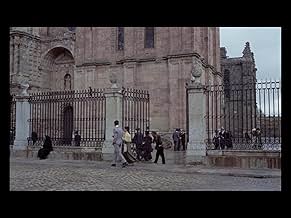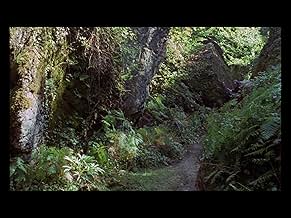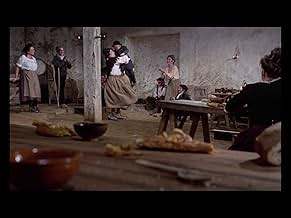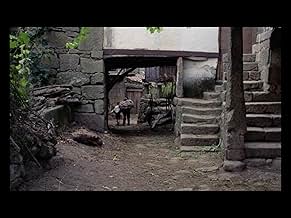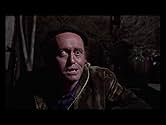अपनी भाषा में प्लॉट जोड़ेंBenito Freire is a peddler who lives miserably in an environment dominated by ignorance and superstition. He is dedicated to peddling by the Galician towns and suffers severe attacks of epil... सभी पढ़ेंBenito Freire is a peddler who lives miserably in an environment dominated by ignorance and superstition. He is dedicated to peddling by the Galician towns and suffers severe attacks of epilepsy. Through the region begins to spread the rumor that he is a werewolf and that he is p... सभी पढ़ेंBenito Freire is a peddler who lives miserably in an environment dominated by ignorance and superstition. He is dedicated to peddling by the Galician towns and suffers severe attacks of epilepsy. Through the region begins to spread the rumor that he is a werewolf and that he is possessed by a demonic spirit. And it will be precisely the stories that people are telling... सभी पढ़ें
- निर्देशक
- लेखक
- स्टार
- पुरस्कार
- 7 जीत और कुल 1 नामांकन
- Vilairo
- (as Fernando Sánchez Polak)
- Vigaira
- (as Porfiría Sanchís)
फ़ीचर्ड समीक्षाएं
His methods aren't particularly sophisticated, the MO always the same, and so it's surprising that even in the late 19th century he was able to inflict so much carnage in such a small geographical area without arousing suspicion. The web of lies are so loose that it's only a matter of time for the house of cards to tumble, and the local abbot (Casas) reluctantly sets out to discover the disturbing truth.
Lopez-Vasquez is devastatingly effective as the imbecilic, almost Neanderthal looking Benito, his mannerisms and vocal performance match the cowardly itinerant, a man of limited means who seems to feel the world owes him something, despite everyone with whom he comes into contact being courteous and respectful. Deeply resentful of their kindness, which he seems to interpret as patronising pity, he lulls them into entrusting him, then betrays that confidence with callous indifference.
Euro-horror fans will relish the sight of John Steiner in a small supporting role as a Protestant missionary with whom Benito briefly has contact, his character more incidental to the plot than critical in any way, but still interesting to see him in a very early role (the film was made in 1969).
Although not at all gory, there's still one or two scenes that many viewers could potentially find upsetting, the film isn't graphically violent, but its the sanctity the main character breaches that makes the crimes so hideous and deplorable.
Well-paced and photographed, it's an eerie little Spanish folk-horror, hard to find but definitely worth a look. And for those wanting to see lycanthropy, you'll be disappointed to realise there's no werewolf, only a wolf in sheep's clothing which in this case might still be enough to reward your attention.
José Luis López Vázquez plays the film's murderer, Galician pedlar Benito Freire, who has been afflicted with an unspecified ailment since childhood - now, when acting as a guide for travellers, he suddenly becomes gripped by a madness that drives him to kill. Freire is shown not to be a werewolf, but rather suffering from a mental condition - schizophrenia, perhaps - that makes him act in a violent manner against his usual character. The killings are brutal, with the murder of a child being particularly disturbing (he starts to strangle her and then accidentally sets her on fire).
The film is very gradually paced, so much so that it's easy for one's attention to wander at times (I soon started to notice all of the flies in the film), but it is well acted, José Luis López Vázquez putting in a convincing central performance as the killer who evokes pity as much as he does fear. The story builds to a satisfying climax, as Freire's lies eventually start to unravel, evidence mounts against him and he becomes the subject of a manhunt.
7/10. For a more recent version of the same story (but not as good), check out Romasanta (2004), starring the late Julian Sands.
Highly engrosssing terror-mystery flick displaying drama, suspense and social habits from Galicia region. The frightening story starts well and grows more and more until a downbeat finale . It is some different , packing Galician legends and actual events with clear remarks to a killer character who really existed .Filmmaker Pedro Olea shows compellingly the Galician social customs in XIX Century , a hard environment dominated by envy , ambition and misery .Interesting script by Juan José Porto who was actually a descendant of Romasanta/Benito Freire's advocate at law . Being based on the novel El Bosque de Ancines or The Ancines Woods by Carlos Martinez Barbeite .Here stands out the awesome acting from starring Jose Luis López Vázquez as the unsettling and deranged peddler Freire. Being accompanied by a plethora of familiar faces , such as : Amparo Soler Leal ,Antonio Casas , Nuria Torray, Víctor Israel , Maria Vico, Rafael Hernández, Alfredo Mayo, Imma de Santi, Fernando Sánchez Polack , among others .It displays an atmospheric cinematography by cameraman Aurelio G. Larraya, showing splendidly the lush Galician forests .As well as evocative soundtrack including folk , traditional music by Antonio Perez Olea .
The picture is based on the true-life story of Manuel Blanco Romasanta , the traveling vendor, who confessed to the murders of thirteen people , using their body fat to make soap. Romasanta was tried in Állariz in 1852 and avoided capital punishment by proclaiming he was a werewolf . Being judged and condemned by Audiencia Provincial Coruña. He is deemed to be the first and only case of Spanish Licantropy . In similar facts was shot in 2004 "Romasanta : The werewolf Hunt" by Paco Plaza with Julián Sands , Elsa Pataky , Maru Valdivieso.
El Bosque Del Lobo 1970 was competently directed by Pedro Olea ,in his second picture . His first one was Dias de Viejo Color . After that , for six years , Pedro Olea dedicated in advertising and documentary as "Guernica" , "River of Bilbao" and TV series as "Cuentos y Leyendas" and other about Basque themes . With "Un Hombre llamado Flor de Otoño" , Pedro Olea returns to shoot , thanks to subsidy of the Basque government . Subsequently , he made a trilogy about Madrid : "Tormento", "Pim Pam Pum Fuego" and "La Corea" . But his biggest hit were "A Man Called Flor de Otoño" with Jose Sacristan and "Fencing Master" or El Maestro de Esgrima with Asumpta Serna . He also directed "Bandera Negra" about gun smuggling and a military thriller : " Morirás in Chafarinas" . And Olea made two movies dealing with witchery : " La Leyenda del Cura de Bargota" and " Akelarre" . While "El Bosque del Lobo" 1970 is considered to be one of the best films in his prestigious career .
José Luis López Vázquez delivers a committed performance as the tormented Benito, bringing genuine pathos to a character caught between medical reality and supernatural hysteria. He is dedicated to peddling by the Galician towns and suffers severe attacks of epilepsy, and López Vázquez effectively conveys both the physical anguish and psychological deterioration of his protagonist. The supporting cast, including Amparo Soler Leal and Antonio Casas, provides solid work within the confines of somewhat archetypal roles, though their characters remain more symbolic than fully realized.
The cinematography captures the bleakness of rural Spain with appropriate moodiness, employing shadowy interiors and mist-shrouded landscapes that should theoretically enhance the film's Gothic sensibilities. However, the visual storytelling often feels derivative of other European art films of the period, lacking the distinctive voice that might elevate the material beyond its literary origins. The picture is based on the true-life story of Manuel Blanco Romasanta, the traveling vendor, who confessed to the murders of thirteen people, using their body fat to make soap, yet the historical foundation becomes lost in overly stylized presentations.
Where the film succeeds is in its exploration of how collective paranoia can destroy an individual, but where it falters is in its pacing and tonal inconsistencies. Through the region begins to spread the rumor that he is a werewolf and that he is possessed by a demonic spirit, and this psychological transformation should provide the film's dramatic core. Instead, Olea's approach feels more academic than visceral, examining themes of alienation and madness through a lens that distances rather than engages the viewer.
The film's treatment of epilepsy as a source of supernatural suspicion offers interesting social commentary, but the execution lacks the nuanced understanding that might make such material genuinely compelling. While "El bosque del lobo" demonstrates technical competence and features a strong central performance, it ultimately feels like a missed opportunity to create something truly memorable from its rich source material.
क्या आपको पता है
- ट्रिवियाThe film is based on the life of Manuel Blanco Romasanta, a Galician peddler who lived in the first half of the 19th century and was the author of thirteen crimes, also considered the first and only case of lycanthropy in Spain.
टॉप पसंद
- How long is The Ancines Woods?Alexa द्वारा संचालित
विवरण
- चलने की अवधि
- 1 घं 30 मि(90 min)
- ध्वनि मिश्रण
- पक्ष अनुपात
- 1.66 : 1


